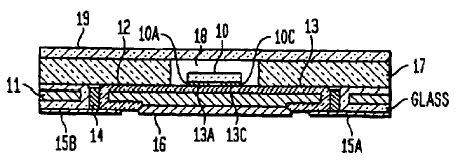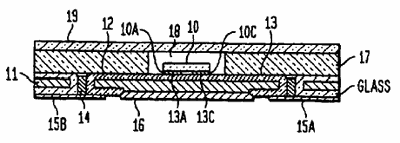Intelligent drive circuit for a light emitting diode (LED) light engine
A controller for controlling a light emitting diode (LED) light engine. The controller includes a temperature sensor configured to sensor temperature at the LED light engine. A current sensor senses a drive current of the LED light engine. A voltage differential sensor senses a voltage differential across LEDs of the LED light engine. A timer monitors a time of operation of the LED light engine. Further, a control device controls the drive current to the LED light engine based on the sensed temperature, the sensed drive current, the sensed voltage differential, and the monitored time of operation. Further, the control device outputs an indication of intensity degradation of an LED, and if the intensity degradation exceeds a predetermined threshold the control can output an indication of such to a user, so that the user can be apprised that the LED needs to be changed.
Background of the invention
1. Field of the Invention
The present invention is directed to a control device for a light emitting diode (LED) light engine, and more particularly to a control device that can efficiently control a drive current provided to the LED light engine.
2. Description of the Background Art
Light engines including LEDs as light sources are well known. An LED as a light source degrades over time, in contrast to an incandescent lamp that operates at a given light output and then at a specific time bums out and ceases to operate at all.
One manner to compensate for the long term degradation of light output by an LED is to initially drive the LED with a much higher driving current than is necessary for a desired light output. For example, an LED can be initially driven with a drive current at, for example, 30% higher than required for a desired light output. In that manner when the LED slowly degrades over time, the light output from the LED will decrease, but the light output can decrease 30% and still output the desired amount of light. For example in this instance if a LED degrades to output 30% less light over five years, then by initially driving the LED with 30% greater drive current than necessary to have a 30% greater light output, the LED will properly operate for five years before its light output falls below a desired level.
Further, in such a background system when the LED finally outputs less light than desired, i.e. in this example when the light output is degraded by greater than 30%, no clear indication is provided that the light output from the LED has significantly decreased or fallen below a determined threshold.
Brief summary of the invention
The applicant of the present invention recognized that such a background way of driving an LED has significant drawbacks in that it requires the LED to be driven harder than necessary and to consume significantly more energy than needed to provide a desired light output. That is, when the LED initially is driven with a drive current 30% higher than that necessary to achieve a desired light output, the LED will consume significantly more energy than needed. As one of the benefits of using LEDs is that they are more energy efficient than an incandescent bulb, driving an LED with more power than needed for a desired light output mitigates one of the benefits of using an LED. Also, driving LEDs with more power accelerates degradation of the LEDs and shortens their operating life, thereby mitigating another benefit of using LEDs.
Accordingly, one object of the present invention is to provide a novel device and method for driving an LED light engine that addresses and reduces the above-noted drawbacks in the background art.
A more specific object of the present invention is to provide a novel control for driving an LED light engine that is more energy efficient and leads to a longer operating life for an LED, by not initially driving an LED with a higher drive current than needed for a desired light output. The novel control of the present invention intelligently varies a drive current supplied to an LED light engine to drive an LED light engine to output a constant desired light output throughout its life.
Further, another object of the present invention is to provide a novel system and method for providing an indication when an LED light output has degraded below a certain point.
Claims
1. A controller for controlling a light emitting diode (LED) light engine comprising: a temperature sensor configured to sense temperature at the LED light engine; a current sensor configured to sense a drive current of the LED light engine; a voltage sensor configured to sense a voltage differential across LEDs of the LED light engine; a timer configured to monitor a time of operation of the LED light engine; and a control device configured to control the drive current to the LED light engine based on the sensed temperature, the sensed drive current, the sensed voltage differential, and the monitored time of operation such that the LED light engine outputs a same desired light output throughout its useful life.
2. A controller according to claim 1, wherein the control device controls the drive current of the LED light engine based on integrating the sensed drive current with respect to time.
3. A controller according to claim 1, wherein the control device controls the drive current to maintain a light output of an LED based on comparing the sensed temperature with stored intensity degradation factor data correlating an intensity degradation factor with temperature and a color of the LED.
4. A controller according to claim 1, wherein the control device controls the drive current to maintain a light output of an LED based on comparing the monitored time with stored data correlating an intensity degradation factor with time.
5. A controller according to claim 1, wherein the control device further outputs an indication if the intensity degradation factor data exceeds a predetermined threshold.
6. A controller according to claim 5, wherein the indication is a variation in intensity in the drive current to the LED light engine for a predetermined period of time in a transition of the LED light engine from an ON or OFF state.
7. A controller for controlling a light emitting diode (LED) light engine comprising: means for sensing temperature at the LED light engine; means for sensing a drive current of the LED light engine; means for sensing a voltage differential across LEDs of the LED light engine; means for monitoring a time of operation of the LED light engine; and means for controlling the drive current to the LED light engine based on the sensed temperature, the sensed drive current, the sensed voltage differential, and the monitored time of operation such that the LED light engine outputs a same desired light output throughout its useful life.
8. A controller according to claim 7, wherein the means for controlling controls the drive current of the LED light engine based on integrating the sensed drive current with respect to time.
9. A controller according to claim 7, wherein the means for controlling controls the drive current to maintain a light output of an LED based on comparing the sensed temperature with stored intensity degradation factor data correlating an intensity degradation factor with temperature and a color of the LED.
10. A controller according to claim 7, wherein the means for controlling controls the drive current to maintain a light output of an LED based on comparing the monitored time with stored data correlating an intensity degradation factor with time.
11. A controller according to claim 7, wherein the means for controlling further outputs an indication if the intensity degradation factor data exceeds a predetermined threshold.
12. A controller according to claim 11, wherein the indication is a variation in intensity in the drive current to the LED light engine for a predetermined period of time in a transition of the LED light engine from an ON or OFF state.
See full document in pdf.


